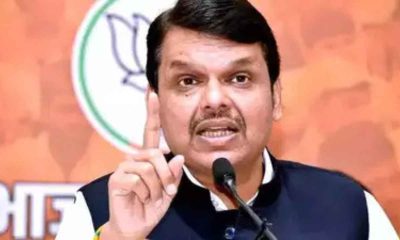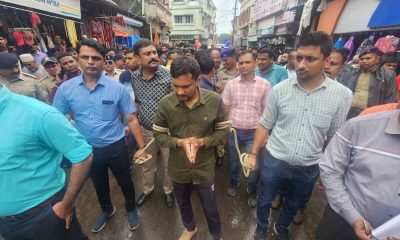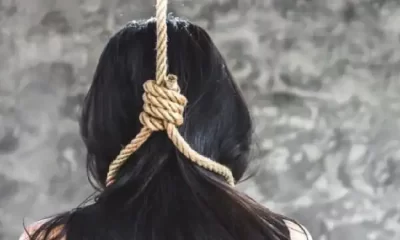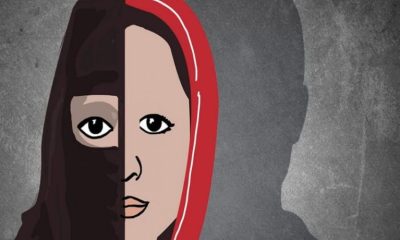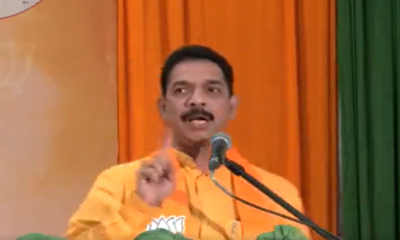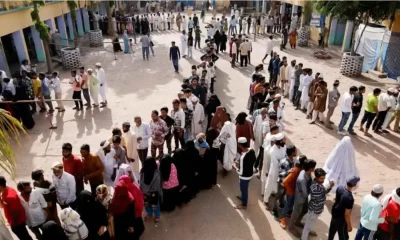India News
Love-jihad case: Supreme Court sets aside Kerala HC order, restores Hadiya-Shafin marriage
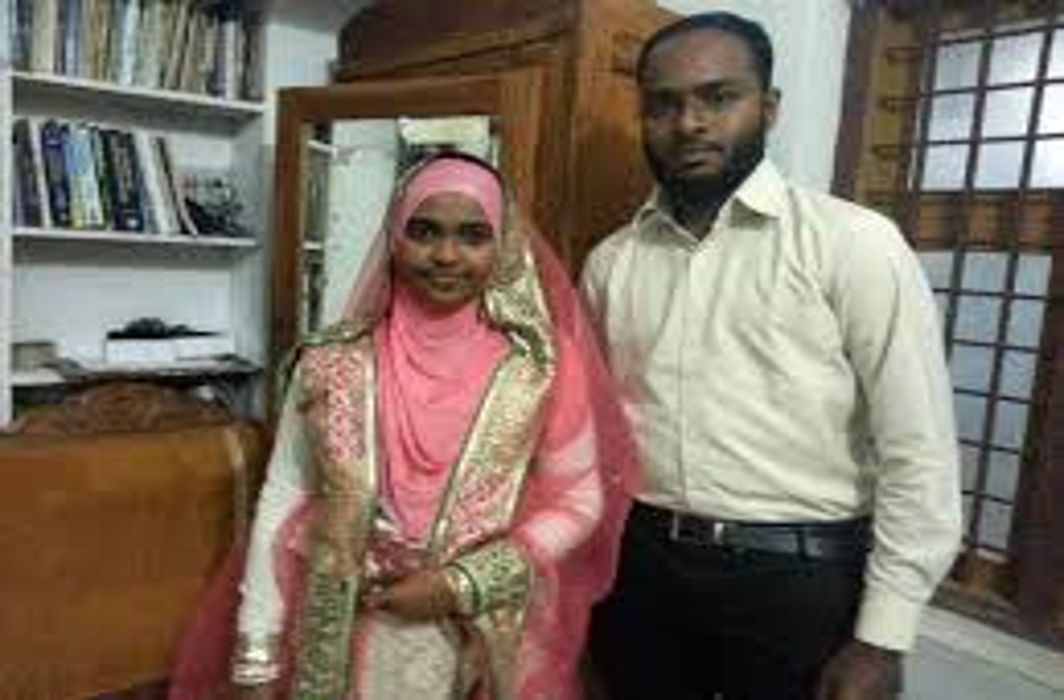
[vc_row][vc_column][vc_column_text]Apex court also said that in case any criminality is found, the National Investigation Agency is free to investigate
The Supreme Court on Thursday, March 8, set aside the Kerala High Court order that annulled the marriage of adult Hadiya with another adult, Shafin Jehan, saying Hadiya was free to pursue her future endeavours in accordance with the law.
After this, Hadiya’s marriage to Shafin stands legally valid again.
In what became famous as the “love-jihad” case, on May 24, 2017, the Kerala High Court had nullified her marriage with Shafin Jehan, sent her to her parents’ custody and ordered a probe into it the so-called ‘love jihad’.
After hearings concluded on Thursday, the Supreme Court’s three-judge bench of Chief Justice Dipak Misra and Justices AM Khanwilkar and DY Chandrachud, in its order allowed appeal but set aside the order where marriage has been annulled while hearing a habeas corpus writ under 226.
The court, however, said that the National Investigation Agency (NIA) probe into alleged cases of Islamic conversion in Kerala by a “well-oiled network” would continue.
The case of the marriage of Hindu girl Hadia, original name Akhila, to a Muslim youth Shafin Jahan created ripples across judicial circles, especially after the Kerala High Court unilaterally annulled their marriage and sent Hadia back to her parents’ house. The issue of whether any court of law or any other third party can declare void a legal wedding of two consenting adults was a problematic issue that the Supreme Court took some time to resolve, because of the extenuating circumstances woven around it.
Hadia’s father Asokan has claimed that Jahan’s principal intention was to recruit his daughter to take her to Syria as a sex slave, or to join a jihadi movement. Even the NIA has become involved in this (the Supreme Court ordered it), having submitted a report on supposed “recruitments” by alleged ISIS recruiting agents. Jahan has been termed as one of them, say allegations. The court was to decide if this was a case of simple love-jihad or a case of planned human trafficking.
The Court had set up a committee to look into this with the help from NIA, but the head of that committee, retired Supreme Court judge, Justice RV Raveendran, in last August turned down the offer. Shafin had thereafter appealed the Kerala High Court verdict.
During the hearing on Thursday, senior advocate Kapil Sibal raised two preliminary objections. He said: “It was a regular habeas corpus writ. So how does the question of validity of marriage arise? How can the high court nullify the marriage?
“Secondly, no third party can move court in order to nullify a marriage which has taken place between two consenting adults,” he said.
Senior counsel Shyam Divan said: “In an appropriate case the high court may annul a marriage. It has the inherent jurisdiction.”
The CJI asked: “Can the court interfere with consensual obsession?”
Justice Chandrachud said: “We cannot completely rule out interference while nullifying the marriage. In exceptional cases the court can. For example, when a 16-year-old girl marries an 80-year-old man because she is poverty stricken or is being coerced. The court can then interfere whether the girl challenges such a marriage or not. This is an extraordinary situation, where trafficking is taking place.”
The CJI asked: “Can you nullify marriage under 226? I have never come across such a situation. We cannot go into the neurological aspect of consent by an adult of sound mind.”
Then the CJI told Additional Solicitor general Maninder Singh: “You can proceed with your investigation without touching the aspect of marriage. If marriage is a disguise to commit a crime, you can hold the person and proceed with the investigation. But whether the marriage is a disguise or not is a separate issue.”
Justice Chandrachud said: “Hypothetically, if the girl wasn’t married, can the court compel the girl to return to her father? No. While hearing a habeas corpus writ under 226, the aspect of marriage won’t have any significance.”
The ASG said: “If a marriage is free and valid, the state or the court has no role. But if prima facie investigation reveals otherwise, in that case what should be the status and role your lordships may decide. I’m not making any submission on that regard. Your lordships can guide us in this case and in future ones.”
Sibal said that the Kerala High Court report came after the order that no offence is made out. These are not scheduled offences.
Divan said: “It is a marriage fraud, therefore it is within the state interest to protect the victim. There was fraud within the marriage, therefore the sanctity of marriage can be invoked in this case?”
The court said: “We are not concerned with the offences here.”
The ASG said: “This is not the case of a love-marriage, but marriage on the basis of an online portal. Under section 153 A, 295A, 107 of the IPC and 57 of the Kerala Police Act an FIR had been registered. She did not mention about her marriage earlier on Facebook, although she is very expressive about her personal life there.”
Divan also mentions other cases where similar modus operandi have been used, saying that this was an organizational racket. “Conversation was there, in which she expressed her desire to go to Syria and her husband wanted to send her to Yemen. The high court noticed that a pattern was taking place where young women were being trafficked in a similar pattern. There were already similar cases before the high court. Thus the high court declared the marriage bogus.
“The high court looked into the matter with additional dimension. Facebook posts etc are enough to invoke the jurisdiction of the high court. As it is a case of marriage fraud and trafficking, can a constitutional body remain mute in such cases?”[/vc_column_text][/vc_column][/vc_row][vc_row][vc_column][vc_column_text css=”.vc_custom_1520506473871{padding-top: 10px !important;padding-right: 10px !important;padding-bottom: 10px !important;padding-left: 10px !important;background-color: #cccccc !important;border-radius: 10px !important;}”]THE TIMELINE
The basics
Akhila is 56-year-old retired Armyman K M Asokan’s only daughter. Her mother’s name is Ponnamma. She is from TV Puram in Kerala’s Kottayam district. She was a mediocre student at the Government Higher Secondary School there and cleared her higher secondary exans on her second attempt. She then joined the private Sivaraj Homeopathy Medical College & Research Institute in Salem, Tamil Nadu, 400 km from her home. She was 18 at that time. She met Shafin on an online marriage site and they were married in 2016. Asokan did not accept this and went to court.
In courts
May 2017: Kerala High Court annuls her marriage. Asokan’s allegation was that Jahan was trying to recruit her for terror activities and take her to Syria. The court sends Hadiya back to her father’s house.
August 16, 2017: Supreme Court orders NIA probe into the case. On camera, Hadiya reiterated that she wanted to stay with her husband and nowhere else. On October 27, in a video recording, Hadiya alleged that she could be killed by her father any moment.
October 30, 2017: Supreme Court orders Asokan to take Hadiya to the apex court. By that time Hadiya was 24.
November 6, 2017: National Commission For Women Meets Hadiya an reported that she was safe and not subjected to any abuse.
November 14, 2017: Asokan denies permission to Hadiya to meet Kerala Women’s Commission
November 15, 2017: Jahan approaches police to seek Hadiya’s safety
November 21, 2017: Hadiya’s father demands that Supreme Court hold in-camera hearing. Before this the NIA had interrogated Shafin for six hours.
November 24, 2017: Hadiya reiterates that she had married of her free will.
November 26, 2017: Asokan’s lawyer says Hadiya “does not have an independent mind” and that she has been “brainwashed”.
November 27, 2017: Hadiya to testify in Supreme Court.
March 8, 2018: The apex court verdict[/vc_column_text][/vc_column][/vc_row]
2024 Lok Sabha Elections
Lok Sabha Elections: Voter turnout 62.02% in Tamil Nadu till 5pm
The voter turnout in Tamil Nadu stands at 62.02%, while Uttar Pradesh records a turnout of 57.5%. Meanwhile, in West Bengal, voter participation surges to 77.5% as of 5 pm.
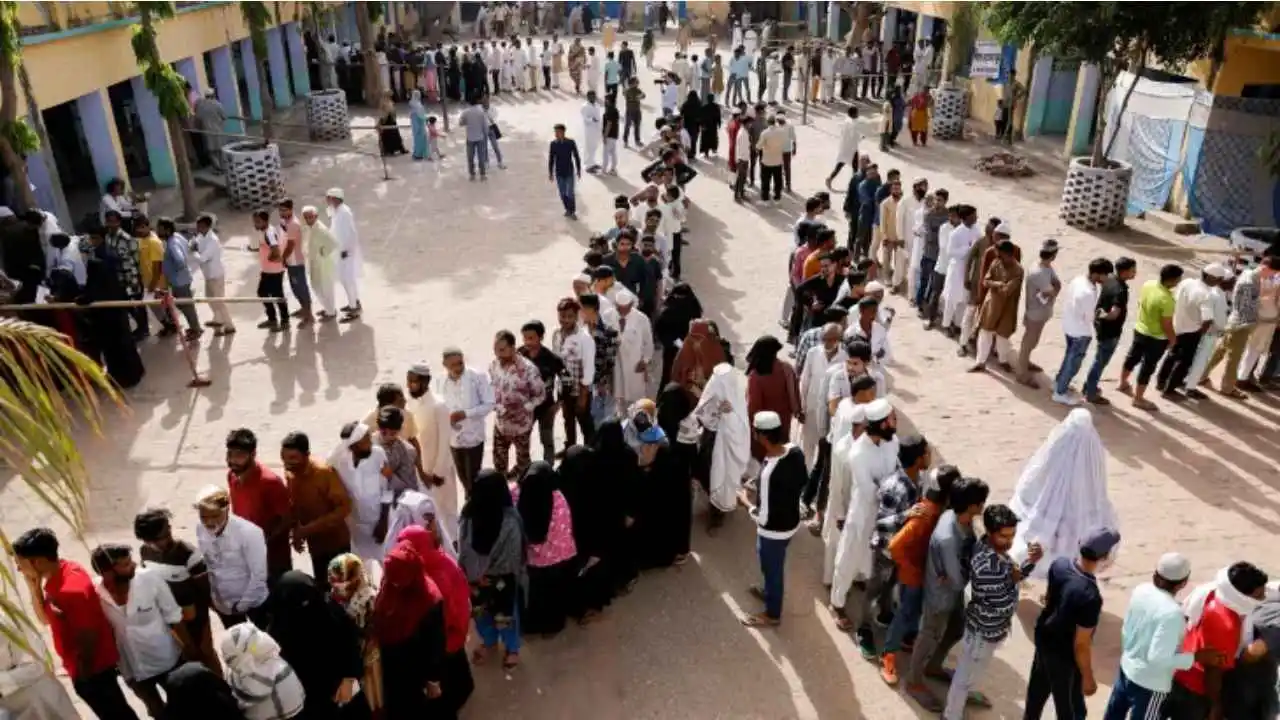
The Lok Sabha elections 2024 began today, marking the onset of the world’s largest electoral event. Voting ended in all 39 Lok Sabha constituencies in Tamil Nadu with a total voter turnout of 62.02%. State BJP chief and Coimbatore Lok Sabha constituency candidate K Annamalai said, they were getting complaints from a large number of voters that their names were missing from the voters’ list.
This incident happened in many places. Annamalai said they are demanding re-poll in places where the names of a large number of voters were missing.He said they had a doubt that there was some political interference because the names of a large number of BJP caders were missing from the voters list.
The voters in South Chennai showed lukewarm interest to participate in the election process and had a total voter turnout of 57.04% till 5pm. Although the overall percentage is poor, some areas like Thiruvanmiyur witnessed brisk polling from 7am onwards. Elderly, middle aged and young voters turned up and it was a family outing for many as they cast their vote.
Corporation volunteers assisted senior citizens with wheelchairs and guided them to their respective polling booths. The hot weather also had an impact on the polling as it reduced the voter turnout as many booths in the corporation school in MGR Nagar were seen deserted around noon. Senior citizens showed courage as they reached the polling booths in private vehicles to exercise their franchise.
Most of the polling booths had shamianas for voters so that they could wait in a queue. Some people even found refuge in the nearby buildings to save themselves from the scorching heat. The polling officials gave instructions to the voters to keep their phones switched off while they exercised their franchise. The security personnel at the polling booth also regulated traffic outside the polling booth in MGR Nagar.
2024 Lok Sabha Elections
Deserted by key supporters, the Kamal Nath story looks set to wind to an end in Chhindwara
Nath’s closest allies in his near 50-year reign—Deepak Saxena and Kamlesh Shah—have deserted him. His local team of corporators has also decided to jump ship leaving a gaping hole in Nath’s campaign trail.
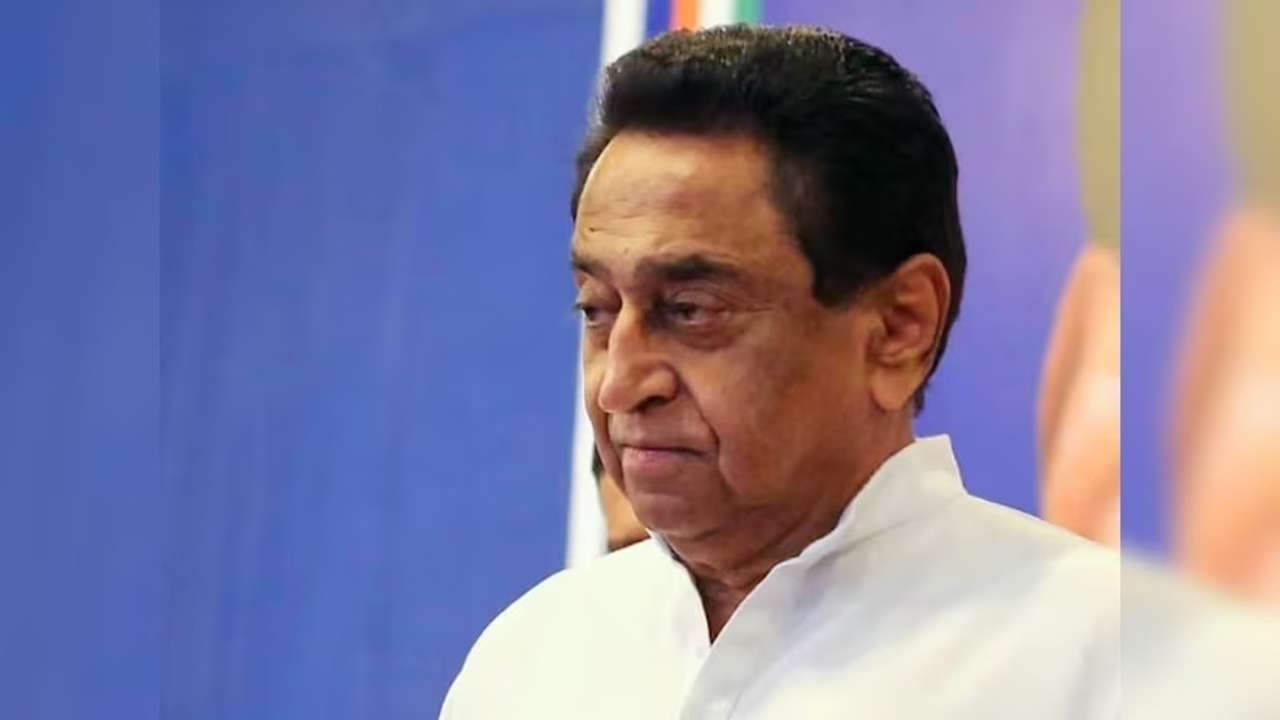
By Neeraj Mishra
The Congress has lost Chhindwara only once since Independence when the wily Sunderlal Patwa was sent there by Atal Bihari Vajpayee to test Kamal Nath’s hold on the constituency. Patwa won the 1997 by-election by a slim margin in the backdrop of Nath having forced his wife to first contest and later vacate the seat for him. Nath, however, returned to his winning ways the very next year and has won the seat nine times.
It seems possible that Chhindwara, the lone surviving Congress seat, will be lost again this time and may be forever. A day ahead of polling, the town was drowned in saffron. Not so much the effect of vigorous campaigning by Vivek Sahu of the BJP but the Ram Navami festival which brought out saffron flags on every rooftop. The effect is likely to last since the polling is today. At 77, Nath is unlikely to contest another election here and his son Nakul seems like a pale shadow of his father unable to even make a forceful speech. The days of running Chhindwara from Shikarpur kothi are gone.
Nath’s closest allies in his near 50-year reign—Deepak Saxena and Kamlesh Shah—have deserted him. His local team of corporators has also decided to jump ship leaving a gaping hole in Nath’s campaign trail. Nakul had won by a margin of 37,000 votes in 2019 and the biggest lead had come from Kamlesh’s Amarwada Assembly segment. With Saxena in control of Chhindwara and forced to show his strength in his new party, it is highly likely that Nakul will not be depending on these segments. Instead, the Congress campaign was focused on Pandhurna, Parasia and Chaurai.
Amit Shah was in the region a couple of days ago and warned all BJP workers—old and new—against lethargy. His message was clear, the BJP wants all 29 seats this time. Cabinet Minister Kailash Vijayvargiya is camped here and using all his political acumen for the desired results. One such tactic was to raid the Shikarpur Kothi of Kamal Nath for his assistant Miglani who handles almost everything for him. With Miglani temporarily neutralised, BJP is best placed to repeat its win in Chhindwara in 1997.
2024 Lok Sabha Elections
Lok Sabha Elections 2024: Nearly 40% voter turnout till 1pm
Chennai recorded an average voter turnout of 34% as of 1 pm on Friday. According data released by the Election Commission of India, Chennai (North) recorded 35%, Chennai (Central) recorded 32.3% and Chennai (South) recorded 34%.
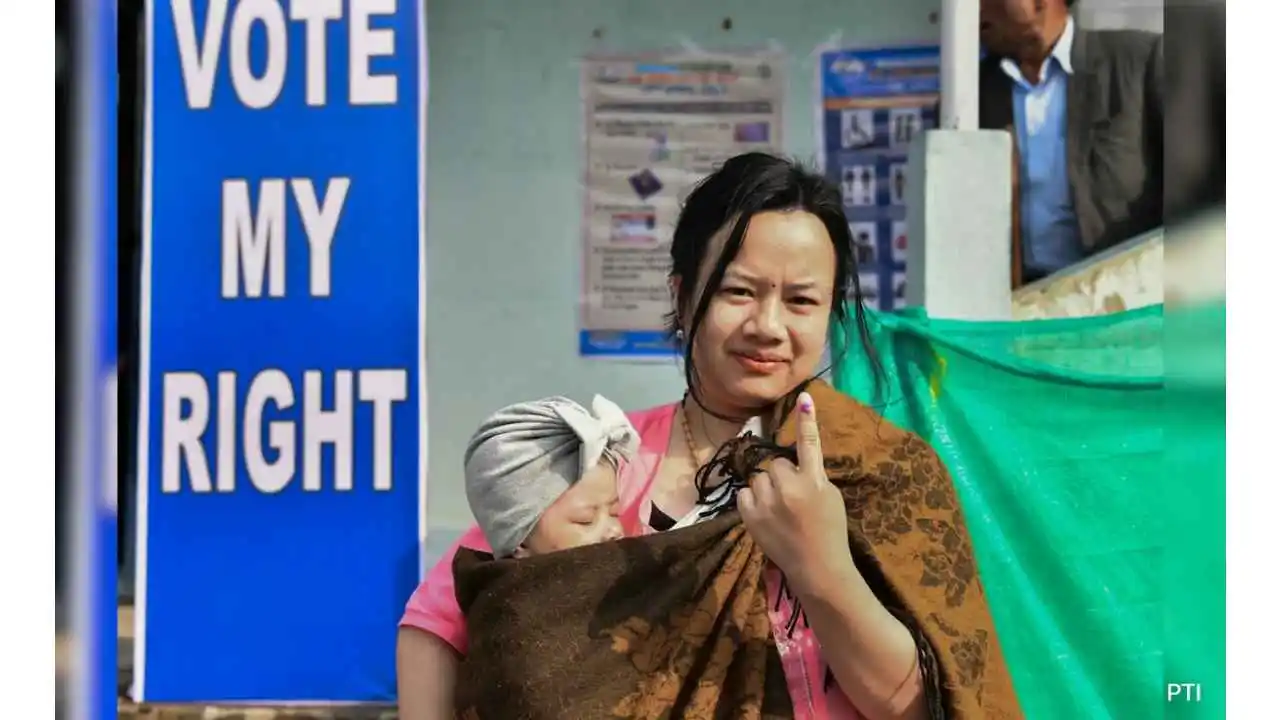
The first phase of voting for the 18th Lok Sabha elections started taking place in 21 states and Union territories on Friday. Nearly 40% voter turnout was recorded till 1pm across the states. Seats in Assam, Arunachal Pradesh, Chhattisgarh, Bihar, Maharashtra, Madhya Pradesh, Manipur, Mizoram, Meghalaya, Rajasthan, Nagaland, Tamil Nadu, Sikkim, Uttar Pradesh, Tripura, West Bengal, Uttarakhand, Jammu and Kashmir, Andaman and Nicobar Islands, Lakshadweep and Puducherry go to elections on Friday.
There has been a substantial increase in the voter turnout charts across the Northeast states, with Tripura leading at 53.04% until 1 pm, as per the data released by the Election Commission of India. Other northeast states like Manipur (46.92%) and Meghalaya (48.91%) are also witnessing high voter turnout. After Tripura, West Bengal is experiencing a high voter turnout of 50.96%.
Chennai recorded an average voter turnout of 34% as of 1 pm on Friday. According data released by the Election Commission of India, Chennai (North) recorded 35%, Chennai (Central) recorded 32.3% and Chennai (South) recorded 34%.
Over 33% voter turnout was recorded in the first 6 hours of voting on Friday in 12 parliamentary constituencies of Rajasthan. According to the Election Commission, voting started at 7 am amid tight security arrangements and 33.73 % voting took place till 1 pm. The highest voter turnout of 40.72 % was recorded in the Ganganagar Lok Sabha seat while Karauli-Dholpur saw the lowest turnout of 28.32 %. Jaipur recorded a poll percentage of 39.35 %.
Over 37 % voter turnout was recorded till 1 pm in the Lok Sabha election being held for five parliamentary constituencies in Uttarakhand on Friday. Elections began at 7 am and the five constituencies recorded an overall poll percentage of 37.33 % up to 1 pm. The Nainital-Udham Singh Nagar seat recorded the highest turnout of 40.46 %, followed by Haridwar with 39.41%, Pauri Garhwal with 36.60 %, Tehri Garhwal with 35.29 % and Almora with 32.29 %.
-
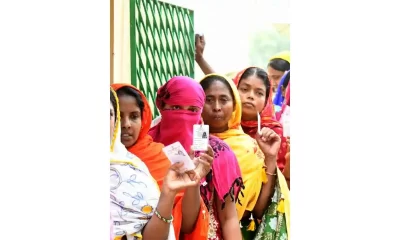
 2024 Lok Sabha Elections23 hours ago
2024 Lok Sabha Elections23 hours agoPrime Minister Narendra Modi urges citizens to vote in record numbers as voting for first phase of Lok Sabha elections begins on 102 seats across India
-
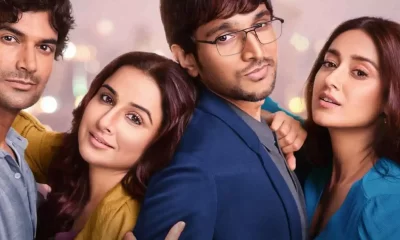
 Entertainment18 hours ago
Entertainment18 hours agoDo Aur Do Pyaar social media review: Social media users say Vidya Balan, Pratik Gandhi deliver standout performances in this adorable film
-
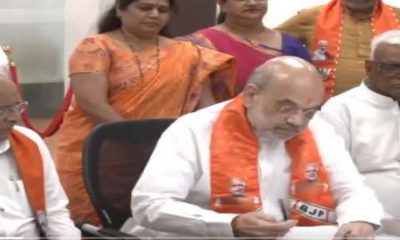
 2024 Lok Sabha Elections19 hours ago
2024 Lok Sabha Elections19 hours agoLok Sabha elections 2024: Amit Shah files nomination from Gandhinagar
-
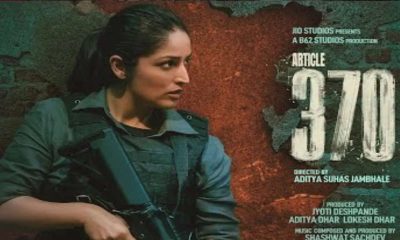
 Entertainment19 hours ago
Entertainment19 hours agoYami Gautam starrer Article 370 releases on Netflix today
-
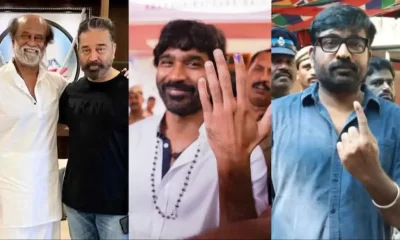
 2024 Lok Sabha Elections21 hours ago
2024 Lok Sabha Elections21 hours agoKamal Haasan, Rajinikanth, Vijay Sethupathi, Dhanush vote in Chennai
-
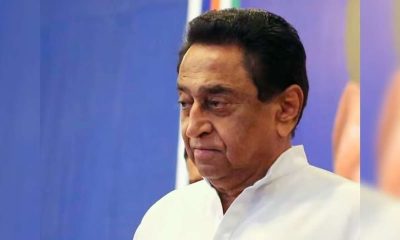
 2024 Lok Sabha Elections15 hours ago
2024 Lok Sabha Elections15 hours agoDeserted by key supporters, the Kamal Nath story looks set to wind to an end in Chhindwara
-
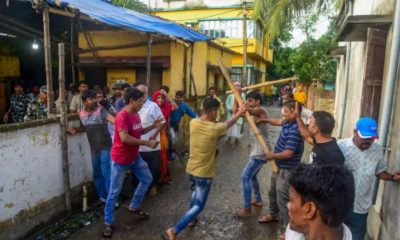
 2024 Lok Sabha Elections21 hours ago
2024 Lok Sabha Elections21 hours agoLok Sabha elections 2024: TMC, BJP workers clash in West Bengal’s Cooh Behar ahead of voting
-

 Entertainment16 hours ago
Entertainment16 hours agoAditya Roy Kapur, Sara Ali Khan’s Metro In Dino to release this November

